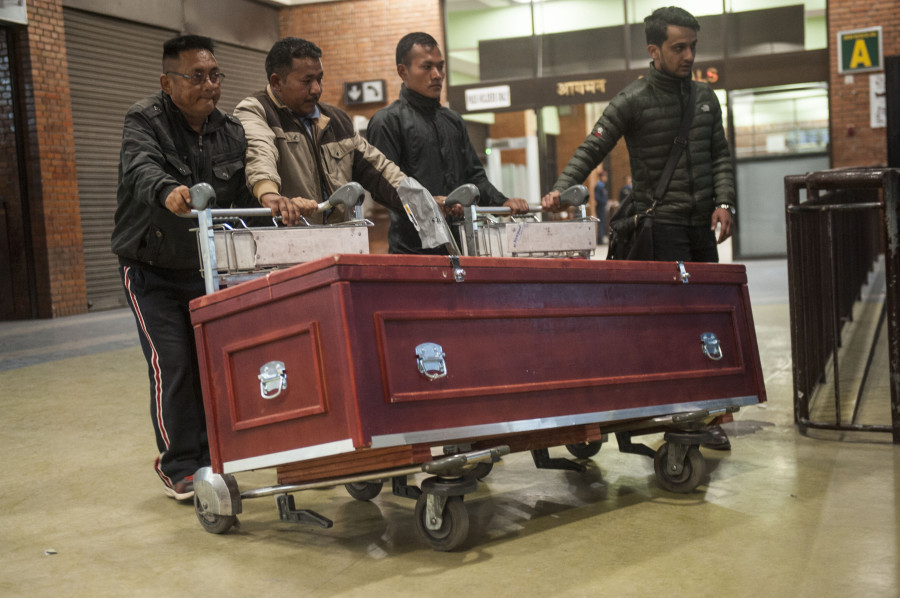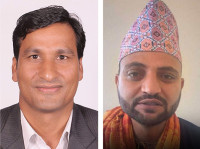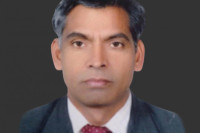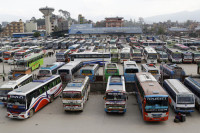National
Home he returns, in a coffin, almost six years after death
When the phone rang on July 8, 2011, Raj Kumar Moktan was sitting with his mother and sisters at Hiledevi-5 in Ramechhap district. The call was from Saudi Arabia where his father Bam Bahadur Moktan had gone to work.
Roshan Sedhai
When the phone rang on July 8, 2011, Raj Kumar Moktan was sitting with his mother and sisters at Hiledevi-5 in Ramechhap district. The call was from Saudi Arabia where his father Bam Bahadur Moktan had gone to work.
When he picked up the phone, his father’s friend was on the other side, who informed him that his father had died while undergoing treatment at Dammam Central Hospital.
“I refused to believe,” said Raj. It took Raj a while to recollect himself. But he had to break the news. A pall of gloom descended on his house. And then started a series of communications and applications at different government agencies and a wait… A long wait of around six years.
The family finally received Bam Bahadur’s body in Kathmandu on Wednesday.
“It’s hard to express my feelings in words,” said Raj, a Nepal Police constable stationed in Solukhumbu, facing the paradox of finally having “to accept” the fact that his father was no more and being happy to receive the body after a long wait after giving up hope. “Shall I say I am happy to have finally received the body, or shall I be sad that he has returned in a coffin?” wondered Raj. “I had accepted that he’s dead. But somewhere deep inside my heart, I always felt like he would come one day.”
The Moktan family had given up hope after the hospital demanded that medical bills be cleared before it released the body. Bam Bahadur was working—in various construction companies—in Saudi without legal status. Hence the hospital administration was expecting the Moktan family to bear the treatment expenses.
“We were told that we had to pay around Rs 800,000 to get the body. We had
told the hospital that we were too poor to have such a huge amount of money,” said Raj.
Bam Bahadur had been working in Saudi for quite a while, but he had barely managed to earn enough to pay back the loan he had taken to go abroad.
The family had filed applications at the consular section of the Ministry of Foreign Affairs and other government agencies, seeking help to get Bam Bahadur’s body back, but to no avail.
After the hospital refused to release the body even after a year, Bam Bahadur’s friend, who worked at the same hospital, suggested the family members that they perform his final rites in absentia.
“He had told us that the hospital would bury the body if it remains unclaimed for more than two years. So we had performed his final rites without the body,” said Raj.
Four years later, the family came to know that the mortal remains of Bam Bahadur were still at the hospital.
“We learnt about the case through the foreign employment information centre where the bereaved family had lodged a complaint. When we enquired the embassy and the hospital, it turned out the body was still in the hospital,” said Basanta Ghimire, whose organisation helped in bringing back Bam Bahadur’s body.
Raj, his mother Maili and his sister Supriya, were at the airport on Wednesday to receive Bam Bahadur’s body that arrived in a coffin.
What causes the delay?
Bam Bahadur Moktan’s story is a classic example of the state apathy towards migrants and their families.
Like the Moktans, it is a common plight of all bereaved families of migrant workers, who have to wait for at least a few months, if not years, to receive the bodies when their kin die in the Gulf countries.
It takes at least three months for a body to return from Saudi, while many rot in hospital morgues for years before being finally sent home. At least 40 bodies are currently languishing in Saudi hospitals, according to Nepal’s mission in Riyadh.
The problem is similar in other Gulf nations—home to nearly two million Nepali migrant workers.
In 2016, at least 950 Nepali migrants, including 38 women, returned home in coffins from various work destination countries, according to data compiled by various embassies of Nepal.
Nepali missions in the Gulf say the red tape and sponsors are responsible for the delay. They claim that the Kafala system makes it difficult for them to promptly send the bodies back.
Under Kafala, a sponsorship system defined by rights group as neo-slavery which ties lives of migrant workers to their local sponsor throughout their work tenure by restricting mobility, even dead bodies require a no-objection certificate from their sponsor in order to leave the country.
While migrants and recruiting agencies agree that the laws of destination governments have some role to play in the delay, they point out the failure on the part of the state.
“They (Saudi and other Gulf countries) have a really lengthy and cumbersome process of releasing the bodies,” said Bimal Dhakal, chairman of Nepal Association of Foreign Employment Agencies (Nafea).
“It’s impossible to bring back the body even if the sponsor is willing to cooperate. The government should hold talks with the governments of the destination countries to shorten the process,” he added.
Recruiting agencies say that it is the responsibility of the government to pay outstanding bills, if there are any, on behalf of the migrant workers to ensure their return.




 11.5°C Kathmandu
11.5°C Kathmandu














